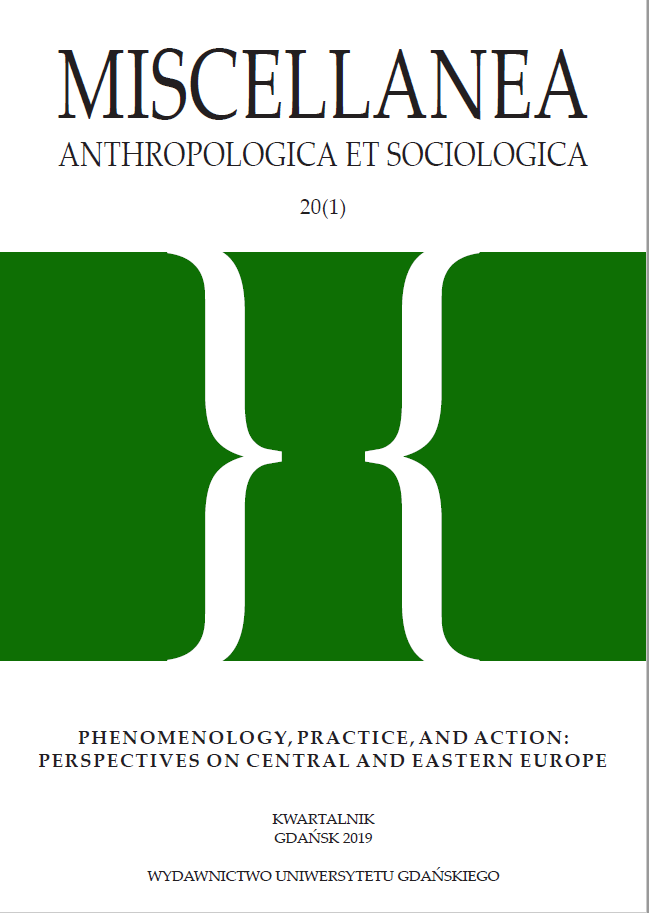Do Good Old Philosophical Values Work Today? Polish Students’ Value Priorities in 2006 and 2017 – A Comparative Study
DOI:
https://doi.org/10.26881/maes.2019.1.11Keywords:
values, hierarchy, young adultsAbstract
BACKGROUND. Values are concepts or beliefs about desirable end states or behaviors, that transcend specific situations, guide selection or evaluation of behavior and events, and are ordered by relative importance. Referring to Scheler’s philosophical concept, the hierarchies of values among Polish students were compared between 2006 (Fanslau & Brycz, 2006) and 2017.
PARTICIPANTS AND PROCEDURE. 603 (in total) adults participated in two studies. All of them were undergraduate students of various Universities from the Tri-City. They filled in the Scheler’s Value Scale.
RESULTS. The results showed that the model hierarchy of values postulated by philosophers is not reflected in the minds of young (18–33 years old) Poles now and it was not reflected over a decade ago either. Moreover, significant differences between the levels of certain values were found.
CONCLUSIONS. It turned out that philosophical theories once accepted and adapted to psychology no longer have the same meaning as before. Value priorities change and they are ordered according to subjective validity.
Downloads
References
Brzozowski P., 1995, Skala Wartości Schelerowskich. Podręcznik [Scheler’s Value Scale. Course book], Warszawa: Pracownia Testów Psychologicznych Polskiego Towarzystwa Psychologicznego.
Brzozowski P., 2007, Wzorcowa hierarchia wartości. Polska, europejska czy uniwersalna? [A model value hierarchy – Polish, European or universal?], Lublin: Wydawnictwo Uniwersytetu Marii Curie-Skłodowskiej.
Carstensen L.L., Isaakowitz D.M., Charles S.T., 1999, Taking time seriously: A theory of socioemotional selectivity, American Psychologist, vol. 54, no. 3, pp. 165–181, http://web.a.ebscohost.com (access: 12.01.2018).
CBOS [Public Opinion Research Center], 2017, Chęć udziału w wyborach i zainteresowanie polityką. Komunikat z badań nr 101/2017 [Willingness to take part in the elections and interest in politics. Research report No 101/2017], www.cbos.pl/SPISKOM.POL/2017/K_101_17.PDF (access: 12.01.2018).
Cieciuch J., 2011, Integration of Schwartz’s values theory and Scheler’s concept of values in research on the development of the structure of values during adolescence, Polish Psychological Bulletin, vol. 42(4), pp. 205–214, DOI: 10.2478/v10059-011-0027-5.
Cieciuch J., 2013, Kształtowanie się systemu wartości od dzieciństwa do wczesnej dorosłości [The development of the value system from childhood to early adulthood], Warszawa: Liberi Libri.
Daniel E., Benish-Weisman M., Boehnke K., Knafo A., 2014, Personal and culture-dependent values as part of minority adolescent identity [in:] R.K. Silbereisen, P.F. Titzmann, Y. Shavit (eds.), The Challenges of Diaspora Migration: Interdisciplinary Perspectives on Israel and Germany, Farnham: Ashgate.
Erikson E., 1980, Identity and the life cycle, New York: Norton.
Fanslau A., Brycz H., 2006, Pokusy i ich wpływ na natężenie wyznawanych wartości wśród młodych kobiet i mężczyzn [Temptations and their influence on values of young women and men] [in:] A. Chybicka, M. Kaźmierczak (eds.), Kobieta w kulturze, kultura w kobiecie [A woman within the culture, the culture within a woman], Kraków: Impuls.
Fischer R., Schwartz S., 2011, Whence differences in value priorities? Individual, cultural, or artifactual sources, Journal of Cross-Cultural Psychology, vol. 42, pp. 1127–1144, DOI: 10.1177/0022022110381429.
Fung H.H., Ho Y.W., Zhang R., Zhang X., Noels K.A., Tam K.P., 2016, Age differences in personal values: Universal or cultural specific?, Psychology and Aging, vol. 31, no. 3, pp. 274–286, http://dx.doi.org/10.1037/pag0000082 (access: 12.01.2018).
Kuderowicz Z., 1965, Scheler – personalizm etyczny [in:] Filozofia i socjologia XX wieku, cz. 2, Myśli i Ludzie [Scheler – ethical personalism in: Philosophy and sociology of XX century, p. 2, Thoughts and People], Warszawa: Wiedza Powszechna.
Rokeach M., 1973, The nature of human values, New York: Free Press.
Scheler M., 1975, Aprioryczne powiązania o charakterze starszeństwa między modalnościami wartości [An a priori hierarchy of value modalities], Warszawa: Wiedza Powszechna.
Schwartz S.H., 1992, Universals in the content and structure of values: Theoretical advances and empirical tests in 20 countries [in:] M.P. Zanna (ed.), Advances in experimental social psychology, vol. 25, pp. 1–65, New York: Academic Press.
Schwartz S.H., Rubel T., 2005, Sex differences in value priorities: Cross-cultural and multimethod studies, Journal of Personality and Social Psychology, vol. 89, pp. 1010–1028, DOI: 10.1037/0022-3514.89.6.1010.
Schwartz S.H., Rubel-Lifschitz T., 2009, Cross – national variation in the size of sex differences in values: Effects of gender equality, Journal of Personality and Social Psychology, vol. 97, no. 1, pp. 171–185. DOI: 10.1037/a0015546.
Schwartz S.H., Cieciuch J., Vecchione M., Davidom E., Fischer R., Beierlein C., Ramos A., Verkasalo M., Lönnqvist J.E., Demirutku K., Dirilen-Gumus O., Konty M., 2012, Refining the theory of basic individual values, Journal of Personality and Social Psychology, vol. 103, no. 4, pp. 663–688, DOI: 10.1037/a0029393.
Seligman M.E.P., 2011, Flourish: A visionary new understanding of happiness and wellbeing, New York: Free Press.
Social Diagnosis, reports, 2015, Objective and subjective quality of life in Poland, J. Czapinski, T. Panek (eds.), http://www.diagnoza.com/pliki/raporty/Diagnoza_raport_2015.pdf (access: 12.01.2018).
Tatarkiewicz W., 1990, Historia filozofii, t. 3, Filozofia XIX wieku i współczesna [History of philosophy. Vol. 3, Philosophy of XIX century and contemporary philosophy], Warszawa: Wydawnictwo Naukowe PWN.
Tischner J., 1982, Myślenie według wartości [Thinking in values], Kraków: Znak.
Vernon P.E., Allport G.W., 1931, A test for personal values, The Journal of Abnormal and Social Psychology, vol. 26, no. 3, pp. 231–248, http://web.b.ebscohost.com (access: 12.01.2018).

 Academic Scientific Journals
Academic Scientific Journals




